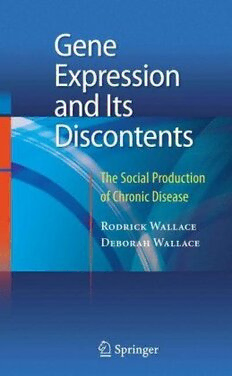
Gene Expression and Its Discontents: The Social Production of Chronic Disease PDF
227 Pages·2010·14.256 MB·English
Most books are stored in the elastic cloud where traffic is expensive. For this reason, we have a limit on daily download.
Preview Gene Expression and Its Discontents: The Social Production of Chronic Disease
Description:
A cognitive paradigm for gene expression, via the asymptotic limit theorems of information theory, allows better understanding of how embedding context affects the development of organisms. In sum, epigenetic information sources act as tunable catalysts, directing ontogeny into characteristic pathways, a perspective having important implications for epigenetic epidemiology. The authors show how environmental stressors, in a large sense, can induce a broad spectrum of developmental dysfunctions, and examine a number of pandemic chronic diseases, using U.S. data at different scales on the effects of the legacy of slavery compounded by accelerating industrial and urban decay. Developmental disorders, broadly taken, are unlikely to respond to medical interventions in the face of serious, persistent individual and community stress. In particular, drugs powerful enough to affect deleterious epigenetic programming will likely trigger side effects leading to shortened lifespan. The address of pandemic chronic disease requires significant large-scale changes in public policy and resource allocation.
See more
The list of books you might like
Most books are stored in the elastic cloud where traffic is expensive. For this reason, we have a limit on daily download.
